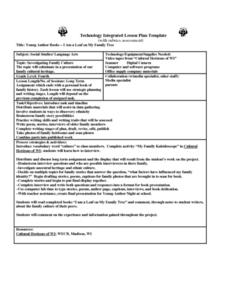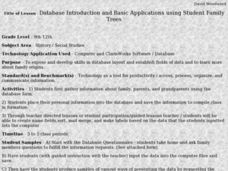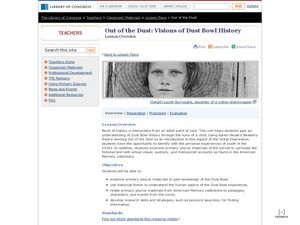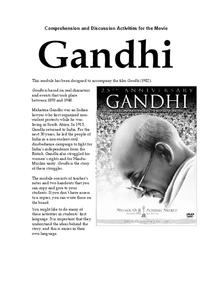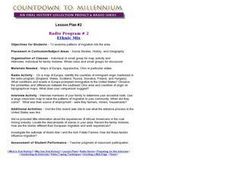Indian Land Tenure Foundation
A Sense of Belonging
In order to understand how the land changes over time because of the people who live there, learners interview an elderly person about the past. Children ask an older family member to describe what the local area was like when they were...
National Woman's History Museum
Women, Education, Sports, and Title IX
Title IX did more than change the face of sports in the United States. This landmark legislation also impacted women in education and politics. High schoolers examine the text of the legislation and the 2016 Senate resolution and watch...
Smithsonian Institution
Art to Zoo: Life in the Promised Land: African-American Migrants in Northern Cities, 1916-1940
This is a fantastic resource designed for learners to envision what it was like for the three million African-Americans who migrated to urban industrial centers of the northern United States between 1910 and 1940. After reading a...
Digital Public Library of America
Teaching Guide: Exploring To Kill a Mockingbird
Harper Lee's To Kill a Mockingbird, considered by many to be a seminal piece of American literature, contains many complex literary themes that carry through United States history. Use a series of discussion questions and classroom...
Constitutional Rights Foundation
Why Don’t More People in the U.S. Vote?
To vote or not to vote, that is the question. Secondary scholars explore voter turnout in the United States. The resource uses informational text, group discussion, and a worksheet to help academics understand hindrances to voting...
Center for History Education
Native American Gender Roles in Maryland
Toss gender roles out the window—some societies lived in a world where women not only possessed the family wealth but also were the farmers and butchers. Many Native American societies had more gender equity than European societies....
Global Oneness Project
The Importance of Indigenous Language Revitalization
Middle schoolers consider languages as representations of cultures and the importance of preserving various languages, especially the rapidly disappearing languages of indigenous peoples, in a lesson that tells the story of Marie Wilcox...
Curated OER
Family Ties and Fabric Tales
Ninth graders explore family roots and immigration. In this Ethics lesson, 9th graders research their family history by interviewing their parents. Students create a visual presentation to tell their story to the class.
Curated OER
Beowulf: Songs of Ancient Heroes
Introduce your class to epic heroes with these activities for Beowulf. After watching a video clip, taking notes on heroes, and tracking characteristics of heroism throughout Beowulf, class members retell an episode of Beowulf using a...
Curated OER
Journey
Students complete a variety of enrichment activities that focus on the book, Journey, by Patricia MacLachlan. They create a photo album that shows their own family history.
Curated OER
Young Author Books: I Am a Leaf on My Family Tree
Fourth graders create family tree books. They discuss culture and brainstorm interview questions for family members. They write stories, poems, and captions for family photos. They interview family members and assemble the interviews...
Curated OER
Where I Come From
Students discuss the countries and cultures that are part of their family history. They research the country their family "came from" and write a report.
Curated OER
Cultural Awareness/Sharing Traditions
Students examine and explore cultural traditions that make their own families unique. In groups, they discuss traditions, write about the similarities and differences in the group, and interview other students.
Curated OER
Who's Who In My Family (Book Share)
Students read Who's Who In My Family, relate the story to their own family relatives, traditions and heritage and compare with classmates. They make their own family trees and form a live action family tree.
Curated OER
DATABASE INTRODUCTION AND BASIC APPLICATIONS USING STUDENT FAMILY TREES
High schoolers gather information about family, parents, and grandparents using the database form. They place their personal information into the database and save the information to compile class in formation. They develop skills in...
Curated OER
Torn from Each Other's Arms
Students consider how the institution of family suffered under slavery. In this slavery lesson, students watch segments of "Slavery and the Making of America". Students examine the structure of the Driggus family and discuss how...
Curated OER
Out of the Dust: Visions of Dust Bowl History Lesson Overview
Young scholars complete activities with the book Out of the Dust by Karen Hesse. In this literature activity, students read this story and view the Dust Bowl history from the eyes of a child. They discover the Great Depression and...
Curated OER
Recalling History by Pulling Strings
Learners investigate the role and nature of story-telling as it preserves history and culture and discuss how puppetry serves as an effective method of presentation. They create basic outlines for puppet shows that relay important...
Curated OER
The State of the Family Timeline
First graders study concepts of time and chronological history. In this early childhood history lesson plan, 1st graders create and interpret a timeline listing historical events and family celebrations using one calendar year.
Curated OER
What is Culture?
Students explore the concept of culture. They discuss the Washoe culture, create a word web, develop a family tree of their own family for a class book, and complete a writing assignment.
Smithsonian Institution
Dia de los Muertos: Honoring our Ancestors Through Community Celebration
Oral storytelling has been an important part of every culture. The time-honored practice uses stories as a conduit for a culture's values and customs from one generation to the next. Keep the tradition going with a family interview...
Stanford University
Explosion of the Maine
An intriguing lesson features newspaper articles to help academics understand the political impact of the sinking the Maine and how the American media depicted the event. Scholars also view a presentation, participate in group...
Curriculum Project
Gandhi
Introduce class members to Gandhi's non-violent, non-cooperative ideas with Richard Attenborough's 1982 bio-epic. The film traces the experiences that gave shape to Gandhi's ideas and the actions that eventually lead to the end of...
Curated OER
Radio Program #2: Ethnic Mix
Students examine patterns of migration into the area. They complete various map activities and interviews. Students partake in family histories as well. On a map of Europe, identify the countries of immigrant origin mentioned in the...












